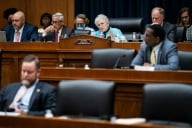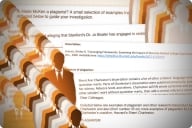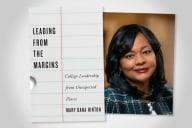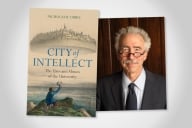You have /5 articles left.
Sign up for a free account or log in.
As a scholar, Adam Laats focuses on the history of education in the United States, not issues of theology. He brings a historical perspective to his new book, Fundamentalist U: Keeping the Faith in American Higher Education (Oxford University Press), focusing on how the institutions evolved and how their history influences their present.
His previous books -- including Fundamentalism and Education in the Scopes Era: God, Darwin, and the Roots of America’s Culture Wars (Palgrave Macmillan) -- have also explored conflicts involving faith and education.
Laats, of Binghamton University of the State University of New York, answered questions via email about his new book.
Q: You have noted elsewhere that you teach at a state university, earned your Ph.D. at (another) public university, and were not raised in an evangelical family. What drew you to this topic?
A: I didn’t approach this research in a religious way. When I study the history of evangelical higher education, I’m not trying to prove that one faction or another were the “real” Christians. I’m not trying to find out which school of creationism is the correct one or which attitude toward student sexuality is the properly biblical one. Instead, I’m interested in fundamental questions about education, politics and culture. I want to know more about competing visions about saving America by creating good schools.
For questions like that, the network of interdenominational evangelical colleges and universities is the obvious place to start. No other family of institutions has been as successful in promoting a dissenting view of the right way to educate students at all levels. In short, I think these colleges should be of primary interest to anyone interested in American politics and culture. After all, our culture-war disagreements aren’t between educated people on one side and uneducated people on the other. Rather, they are fiercest between two groups of people who have been educated very differently.
Q: Many colleges and universities talk about wanting to produce graduates with certain values (service to community, a commitment to critical thinking, understanding of diversity, for example). How do you see evangelical colleges as being different in their perceptions of their role and mission?
A: In one sense, the institutions in my book -- a network of interdenominational evangelical colleges and universities that first came together in the fundamentalist movement of the 1920s -- has some huge advantages when it comes to teaching students how to live moral lives. Unlike many mainline and secular schools, evangelical colleges have never doubted that moral instruction was their primary purpose. To that end, evangelical schools have always insisted first and foremost on maintaining strict rules on student behavior.
In another sense, however, evangelical colleges have been in a bind when it comes to student morality. Having promised to base their student rules on eternal religious truths, it has been extremely difficult for schools to change those rules. Yet the rules must change from time to time. These days, colleges such as Wheaton College in Illinois are struggling to figure out their moral mission when it comes to student gender and sexual identity. In the 1960s, Wheaton struggled to change its rules about white racism and segregation. In the 1920s, Wheaton struggled to figure out how to keep students from attending movies. The issues change from time to time, but the tension remains: all evangelical colleges insist that their strict student rules are derived from eternal, universal truths. Yet all schools have to change those rules from generation to generation.
Q: Many of the leading (by prestige) institutions in private higher education started with religious traditions that have now been largely abandoned. Do you see evangelical colleges today taking steps to assure that their religious identities do not fade away?
A: In all the archives I visited, this was the most pressing question in all the letters I read, in all the editorials and whisper campaigns and snarky gossip among evangelical intellectuals: Is College X or Y still “true”? A primary goal of the fundamentalist movement of the 1920s was to find a way to save higher education from the slippery slopes that had -- according to the fundamentalists -- destroyed evangelical schools in the late 1800s.
Since the 1920s, conservative evangelical intellectuals and college administrators have spent considerable resources to both remain true to their religious identity and to prove beyond any doubt to the wider evangelical community that they did so. This was more than a quirk; it was an institutional life-or-death issue. As more and more evangelical colleges and universities opened their doors in the second half of the 20th century, any rumor that a college had watered down its commitment to evangelical orthodoxy could spell the end of enrollments. Students would simply go elsewhere.
Different institutions handled this challenge in different ways. Some -- such as Bob Jones College (now Bob Jones University) and Bryan University (now Bryan College) -- put “never-change” clauses in their founding charters. It seemed like a simple solution in the 1920s, but it has led schools like Bryan into trouble recently, when they’ve tried to tighten up their rules to remain competitive.
Q: As one who teaches at a leading public university, how do you rate the quality of undergraduate education at evangelical colleges?
A: Just as at all institutions of higher education, there is great diversity in evangelical academic life. As a general rule, I think all evangelical colleges have benefited from their traditions in some ways. For example, students at evangelical colleges are less likely to suffer from the anonymity and isolation of students at huge, impersonal state universities. However, students at evangelical colleges will also feel much more pressure to conform to stronger moral traditions. At some colleges, those pressures for conformity can be suffocating for those who don’t fit in.
Q: Questions about sexuality (especially treatment of gay people) and science (especially questions about evolution) have caused controversy at some evangelical colleges. How much of a challenge do these issues pose to these institutions?
A: Today’s challenges about sexuality and science are only the latest examples of the essential tension at the heart of evangelical higher education. All evangelical institutions of higher education insist on the very best modern educations. And all insist on the very purest evangelical religion. Yet the definitions of both things have constantly shifted and evangelical schools have always struggled to keep up. In the 20th century, evangelical colleges wrestled with other incarnations of this same essential tension: Can an evangelical student attend movies? Have an interracial relationship? Use a non-King James Bible? Appreciate Billy Graham’s revivals?
These days, the answers to those questions generally is a firm yes, but each of them was intensely controversial in its day. Will this tension hurt evangelical colleges? Yes and no. Today’s controversies over sexuality and science will split evangelical institutions. Some schools will take a stronger anti-homosexuality stand. Some will take a stronger young-earth-creationism-only stand. Other schools will go the other way. But schools on both sides of each controversy can continue to thrive, attracting students from evangelical families seeking a school that reflects their own vision of real evangelical identity.
Q: Liberty University is not a member of Council for Christian Colleges and Universities, but it may be the best known evangelical college these days. Many in Christian higher education seem uncomfortable with the closeness of Liberty and its leaders with President Trump. How unusual is this close political relationship?
A: Even the Liberty community itself is torn. Many students, faculty and alumni have made their anti-Trump feelings clear. As a general rule, however, evangelical colleges and universities have always been intensely political places. Evangelical campuses have always been islands of Make America Great Again conservatism.
Myths about evangelicals retreating from politics during the middle part of the 20th century just don’t match the historical record. It can be easy to downplay this tradition, since evangelical school leaders have often talked about staying out of politics. On evangelical college campuses, though, “staying out of politics” has often meant avoiding endorsing one political party or another, while maintaining steady activism for conservative political causes. However, as in all things, when it comes to politics, evangelical campuses have been diverse and divided. Though the institutional leadership has always leaned hard to the right, there has also been a long tradition of a progressive political underground among students and faculty. Just as some Liberty alumni are the most vocal of the anti-Trump evangelicals, so some students and faculty have always been thoughtful religious critics of political conservatism.
Q: What would you most like academics in nonevangelical higher education to know about those that operate in Fundamentalist U?
A: Two things. First, when we at public or mainline universities talk about “American higher education,” we need to be more aware of the true diversity of institutions out there. Too often, academics blithely assume that there is one standard to which all colleges yearn. It’s just not true.
Second, secular academics like me tend to lump together evangelical colleges unfairly. We tend to miss the vast diversity within the family of evangelical institutions. These days, an evangelical college like Gordon College near Boston has more in common with many nonevangelical colleges than it does with a hard-line conservative college like Pensacola Christian College. Outsiders like me often don’t understand the real diversity within the world of evangelical higher education.
For more from Laats, see his blog, I Love You but You're Going to Hell.








